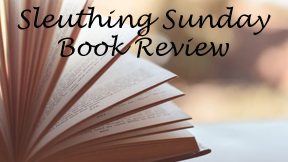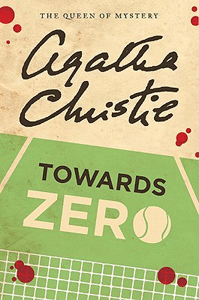“Towards Zero” (1944) is one of those Agatha Christie novels I consider to be a snack more than a full-course meal. I breezed through it in a day. It’s an excellent character piece for most of its 178 pages, but it’s kept from elite status by its unlikely final-act revelations.
Battling for love
Notable Christies of the 1940s are defined by how she brings character and plot together. The masterpiece of this type is “Five Little Pigs” (1942), and I also have a soft spot for “The Hollow” (1946). In those novels, we feel the pain of lost loves and the longing to find true love. Meanwhile, the plots are sneakily ingenious.
“Towards Zero” — an Inspector Battle novel whereas the other two are Poirot novels – similarly features a love triangle filled with strife and pain. The victim of romance’s predations is Audrey Strange, whose husband – amateur tennis star Nevile — has left her for the vivacious Kay.

“Towards Zero” (1944)
Author: Agatha Christie
Genres: Mystery, romance
Series: Superintendent Battle No. 5
Setting: Gull’s Point, England, 1944
When Christie writes about this novel’s young women (another is Mary, the caretaker of elderly Lady Tressilian), I think of older-fashioned costume dramas such as Jane Austen’s catalog. They are pretty in their unique ways, sad in their unique ways. A man pursues each of them, and they have perhaps chosen the wrong man. There’s as much to sort out in these women’s minds as there is in the mystery plot.
That’s saying something, because “Towards Zero” eventually develops into a doozy of a plot. In order to set it apart from similar novels of this period, Christie’s wrinkle is that the murder isn’t a story’s start, it’s the end – the zero hour.
The narrative starts a year before the murder with an unidentified character planning out a perfect scheme. Then we meet all the players, most of whom could be the schemer.
Autumn encroaches
An evocative setting helps “Towards Zero” stand out from the pack. It’s September at Gull’s Point, Lady Tressilian’s large house on a cliff at a river mouth. Across the bay is a modern resort. It’s unusually warm for the season, but a chill encroaches, and then rain.
The weather fits with the vague sadness of most of the characters – and the straightforward depression of wild card Angus MacWhirter. He fails to kill himself near Gull’s Point as the novel begins, then returns at the time of the main events.
Through MacWhirter, Christie suggests a spiritual purpose to life. He might not know why he should keep living, but – his nurse suggests to him – if he keeps living maybe it will be revealed to him. Perhaps it’ll be a small moment where he helps someone. Christie is not schmaltzy; MacWhirter declines to try suicide again not because he’s happy, but because he can’t work up the motivation.

Because we subconsciously allow one big coincidence per story, I’m fine with the MacWhirter framing mechanism.
An unlikely twist
The final act, though, asks a reader to buy too many unlikely and inconsistent behaviors. “Towards Zero” was heading toward greatness, but it settles for very good.
(SPOILERS FOLLOW.)
We learn that one character is not how he presented himself. This is a common Christie twist, but here it requires too many people to willingly play along for shaky reasons. Also, if this crime is planned a year in advance, it’s remarkable how sloppy it is. The criminal ingeniously plans out double bluffs, yet leaves a bevy of incriminating evidence.
The criminal’s sloppiness isn’t impossible, since the character is revealed to be crazy. But I didn’t buy that someone who is crazy could act so sane, without giving himself away, then also be so sloppy. It’s like the plot depends on it.
Amateur psychology
The ending also undercuts the theme of crime-solving via psychology. Battle removes his daughter from a boarding school where the headmistress finds the daughter guilty of theft on “psychological” grounds: She “looks” guilty. In reality, the poor girl makes a false confession in order to end the harsh scrutiny.
Veteran police inspector Battle, we’re told, knows about legitimate psychology, and that’s why he can solve this case. (It’s interesting that Christie doesn’t use Poirot here. But Battle does channel Poirot – and name-drops him for the reader — when uncovering a murder weapon.)
But the psychology angle is undermined due to the absurdity of the big-picture portrayal of the criminal. He exists in the lurid-literature realm of the over-the-top psychosis. The headmistress wouldn’t be equipped for this, but I doubt the straight-shooting Battle would be either (except that Christie says he is).
Still, the relationships – both when they fall apart and when they come together – shine through. Christie makes sure to give happy endings to every non-insane character. It’s an appealing, sunny conclusion to cap the stormy vibe of “Towards Zero.”
Sleuthing Sunday reviews an Agatha Christie book or adaptation. Click here to visit our Agatha Christie Zone.

